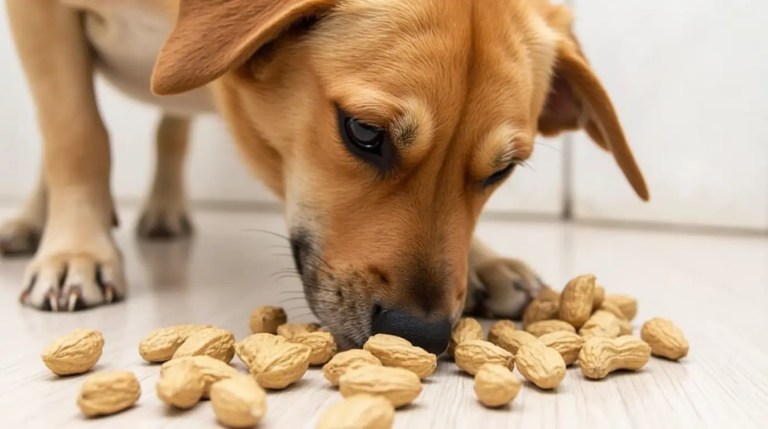This guide will aim to be the ultimate resource for dog owners curious about feeding peanuts to their furry friends, covering safety, benefits, risks, and best practices.

1. The Short Answer: Yes, But With Big Caveats
Start with a clear, concise answer, then immediately introduce the necessary qualifications.
- Generally Safe (with conditions): Plain, unsalted, dry-roasted (or raw) peanuts can be a safe treat for most dogs in small quantities.
- Crucial Exceptions: Emphasize that not all peanuts or peanut butter are created equal, and certain ingredients are highly toxic.
2. The Nutritionists Weigh In: Why Peanuts Can Be Good
Features of peanuts Although it is not one, peanuts provide some useful minerals.
- Protein: Fundamental for muscle growth and recovery.
- Healthy Fats: Beneficial for skin and coat health, as well as the energy source.
Vitamins & Minerals:
- Vitamin E: An antioxidant that helps protect cells.
- Niacin (Vitamin B3): Essential for metabolism and healthy skin/coat.
- Manganese: Needed for bone formation and healing wounds.
- Other B-vitamins : (including B6) that help to fulfill vital roles in the body.
3. The Big Risks, and a Few Tips to Keep in Mind
This is where you get into the possible hazards.
- Xylitol Toxicity (Crucial!): An artificial sweetener that can be found in some “sugar-free” peanut butter and can be deadly for dogs in even tiny amounts. It can lead to a sudden decrease in blood sugar (hypoglycemia), liver failure, and is lethal. Always read labels for xylitol.
- High Fat & Pancreatitis: Peanuts are an energy-rich food which are high in fat.
- Digestive Upset: Too many can lead to stomach upset (vomiting, diarrhea).
- Pancreatitis: Regular or excessive consumption can inflame the pancreas, a very painful and potentially life-threatening condition.
- Sodium (Salt): Salted peanuts contain too much sodium for dogs, leading to
- Salt Poisoning (in severe cases): Symptoms include vomiting, diarrhea, lethargy, tremors, and seizures.
- Choking Hazard:
- Whole Peanuts: Especially for smaller breeds, whole peanuts can be a choking risk.
- Shells: Peanut shells are indigestible and can cause choking or intestinal blockages.
- Aflatoxins: Peanuts can sometimes contain aflatoxins, toxins produced by certain fungi in warm, humid environments. Ingestion of these toxins can cause liver damage or even acute liver failure, especially with prolonged exposure. While commercial peanuts are generally monitored, it’s a consideration.
- Allergies: Just like humans, dogs can be allergic to peanuts, although it’s relatively rare.
- Symptoms of Allergic Reaction: Vomiting, diarrhea, hives, itching, swelling (especially of the face or throat), difficulty breathing, excessive licking, skin redness, ear infections.Severe reactions (anaphylaxis) require immediate veterinary attention.
- Added Ingredients: Avoid peanuts or peanut butter with:
- Sugar: Contributes to weight gain and dental problems.
- Other Sweeteners: Besides xylitol, other artificial sweeteners might not be directly toxic but offer no nutritional value and can cause digestive issues.
- Spices/Flavorings: Can upset a dog’s stomach or be harmful.
- Chocolate, Raisins, etc.: Many common human food additives are toxic to dogs.
4. The “How-To”: Safely Feeding Peanuts to Your Dog
Provide actionable advice for responsible feeding.
Type of Peanuts:
- Plain, Unsalted, Dry-Roasted: Best option.
- Raw: Also acceptable, but ensure they are human-grade to minimize aflatoxin risk.
- NO Salted, Honey-Roasted, Spiced, or Flavored Peanuts.
Preparation:
- Always Remove Shells: Essential to prevent choking and digestive issues.
- Consider Crushing: Especially for smaller dogs, crushing peanuts can reduce choking risk and aid digestion.
- Portion Control (Crucial!): Peanuts should be an occasional treat, not a regular part of their diet. They should make up no more than 10% of your dog’s daily caloric intake. Provide general guidelines based on dog size (e.g., 1-2 peanuts for extra-small dogs, a small handful for large dogs), but emphasize consulting a vet for specific recommendations.
Peanut Butter Specifics:
- Xylitol-Free is NON-NEGOTIABLE: This is the most critical point.
- Unsalted, Unsweetened, Natural: Opt for peanut butter with only one ingredient: peanuts.
- Moderation is Key: A small lick from a spoon, stuffed in a Kong, or as a pill hider is usually fine.
- Introduction: Start with a very small amount to monitor for any allergic reactions or digestive upset.
5. When to Call the Vet
Empower owners with knowledge of when to seek professional help.
- Immediate Concern: If your dog ingests xylitol, experiences severe allergic reaction (swelling, difficulty breathing, collapse), or shows signs of severe pancreatitis (persistent vomiting, abdominal pain, lethargy).
- Monitoring: If they eat too many peanuts or salted peanuts, watch for signs of digestive upset, increased thirst, or general discomfort.
- Any Suspected Allergy: If you observe itching, hives, or different slight allergic signs and symptoms, consult your vet earlier than imparting peanuts once more.
6. Alternatives to Peanuts
Suggest other safe and healthy treats for dogs.
- Baby carrots
- Apple slices (no seeds or core)
- Green beans
- Blueberries
- Specific dog treats
Conclusion: Moderation and Awareness are Key
Summarize the primary takeaways. Peanuts can be a safe and enjoyable treat for puppies, but simplest while given efficaciously and carefully, with constant vigilance for harmful substances like xylitol. Always prioritize your canine’s individual fitness and seek advice from your veterinarian with any worries.
